When the cannabis edibles space first became a potentially legal thing in Canada, my first thought was about how my life would change for the better when I could drink a beverage that would either hit me with a nice shot of CBD, or wipe me out with THC, or hey – maybe both. Fast acting, consistent, maybe it would even taste good? It seemed like paradise. I could conceivably, one day, get a slight buzz, a CBD health shot, maybe some caffeine added or even a protein dose tossed into the bargain.. it would replace my morning coffee. It was going to be great.
So here we are, years later, all I got was this terrible Canopy Growth Corp (WEED.T) ‘Houndstooth and Soda’ beverage that tastes like lawn with bubbles, and has all the buzz of a turkey sandwich.
Across the BC, Ontario, and Alberta online cannabis stores today, you can only find an actual canned cannabis product in BC. Ontario doesn’t stock them, Alberta is out. The BC options are the above mentioned paddock drink from Canopy, or Everie’s lemon-lime CBD beverage that may just be the most expensive way to https://equity.guru/wp-content/uploads/2021/10/tnw8sVO3j-2.pngister CBD available today, though I am reliably informed it’s tasty at least.

There are teas out there, from Everie and Haven Street, but that’s not my jam. Even the illegal operators have no beverages to speak of.
When Canopy, which has the might of the largest alcoholic beverage seller in the world behind them, rolls out a terrible product (and remember, this is their second iteration after the first one was so bad they didn’t even release it to market), what does that say about the smaller players and their ability to navigate this new space?
Cannabis beverages are hard to do. There are entire companies around dedicated to figuring out the mechanics of how to get you a stable, consistent THC shot that doesn’t taste like Secretariat stood over the bottle.
And yet, in California, there’s so many beverages around, in so many flavours, that one could accurately suggest it’s a breakout sub sector.
SO WHAT’S UP, CANADA
The Canadian beverage space has been fucked from the outset, as usual, by our regulators, who appear to still think cannabis products are dangerous and will give you cancer and make your children human trafficking targets. In the great white north, you can’t sell a beverage that:
- Has alcohol in it, or associated with it
- Has notable branding
- Consists of more than 2.1 litres per order (that is, a six pack)
- Has more than 10mg of THC
So all those alcoholic beverage companies that bought into Canadian LPs thinking they were going to do a THC version of Coors Light or Bacardi are shit out of luck.
Or are they? Sproutly (SPR.C) is a company that emerged during the cannabis pubco good times as the holder of a unique piece of technical IP that allowed them to ‘wash’ the THC out of flower with a series of reagents, in a way that would make it easier to apply to beverages. That seemed promising, and drew investor attention, but almost immediately the company went quiet.
Last May, that changed when the company announced a JV with a subsidiary of Moosehead Brewing to create cannabis beverages. In October, they sent out an update saying, basically, ‘oh hey, yeah, still working on this.’
“Although the legal framework of the joint venture has taken longer than expected, both Moosehead and Sproutly have allocated significant resources to the joint venture since the announcement in May, 2019. As a result, there has been substantial progress made on the business and product development of infused beverages.”
Cool. Fast forward to two weeks ago.
Sproutly Canada Inc. has provided an update on its business strategy and operations. In light of the significant advancements made by Sproutly and Infusion Biosciences Inc. on the APP Technology, as well as recent developments in the cannabis industry in Canada, the company will now accelerate the commercialization of the APP Technology in Canada.
Wait, what? NOW you’re accelerating things?
What happened to last May? Last October? Why are you only now accelerating things and what does that even mean?
“Our primary objective continues to be: to bring the APP Technology to market through commercializing products in many new and innovative ways.”
What ways? Where are they? The market is open, how can you not be in it?
Seriously, you had ONE JOB.
“Moosehead continues to be a key part of our story. The tremendous amount of work that Sproutly and Moosehead have completed to date gives us a great deal of confidence that our collaborative beverage products will be unmatched and stand alone in the beverage category.”
And I have great confidence Charlize Theron thinks I’m hot but she’s not exactly kicking my bedroom door down, Sproutly.
For nearly a year now, Sproutly has been saying “we’re making great progress”, but Canopy had an (admittedly terrible) product out the door first and I see no evidence of any other company utilizing, or even talking publicly about utilizing, Sproutly’s IP.
I suspect, given the company is borrowing money from its subsidiary and had a six-figure cash position after its last financials, that either the tech works and they don’t have the money needed to commercialise it, or it doesn’t and they’re switching to a bog standard LP model.
Either way, down it goes.
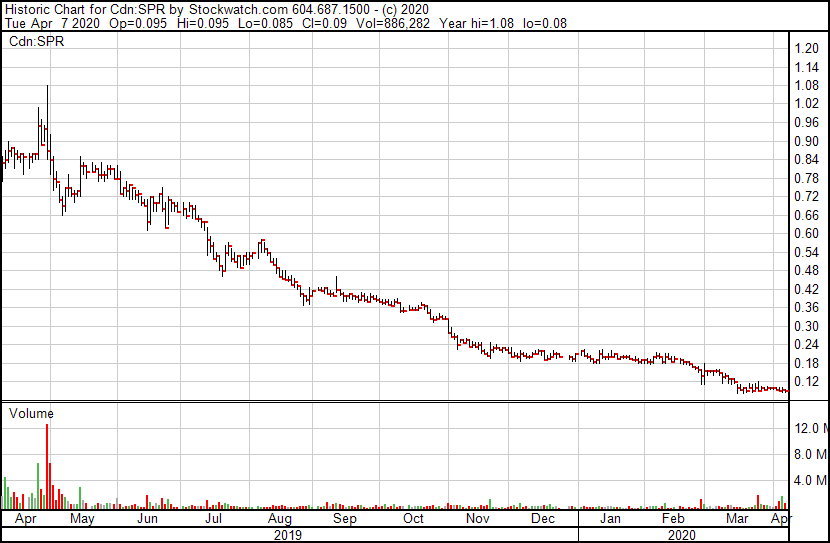
Another early player, at least on paper, was Province Brands, a private company soliciting funds on the basis that they were going to brew beer with cannabis, a thing that they were betting would be legal but isn’t, at all. They’ve gone very quiet lately – the last piece of news posted on their site was a story about how Health Canada wanted nothing at all to do with anything relating weed to alcohol, which would suggest their business model is kaput.
Called it.
The Green Organic Dutchman (TGOD.T) talked about beverages non-stop, from even before the company went public. It hired beverage guys from global soda distributors. It put them in charge of the whole show. It put almost no effort into its LP side of the operation for quarter after quarter because beverages were coming and they were going to own that space, boy howdy.
And yet, here we are today, with TGOD’s website is telling us that, ‘soon’, they’ll have teabags.
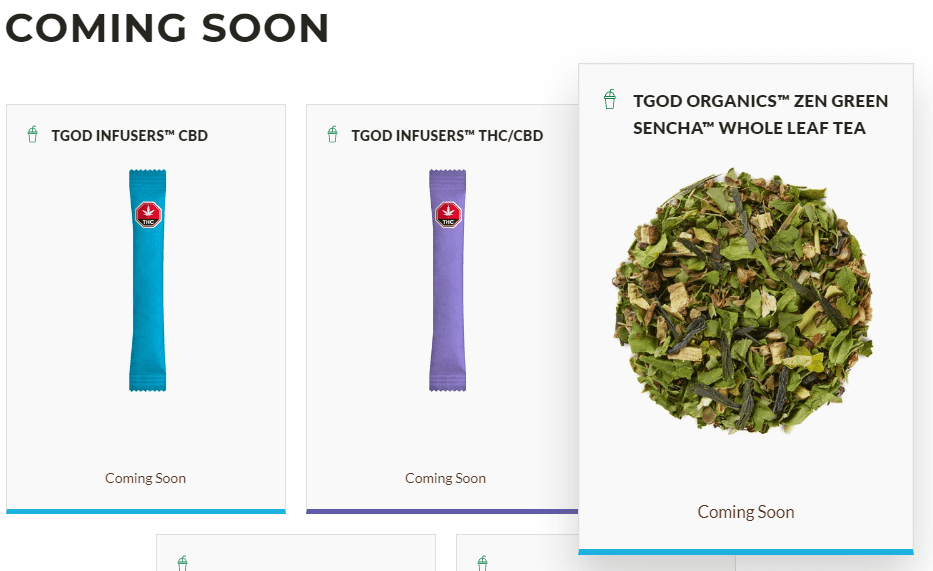
Wut?
That’s it?
Dudes, I can make weed teabags at home. The technology was out there in 1930. Weed in a bag mixed in with some rooibos, it’s not rocket science, but this is all you have going on after three years of bragging about your beverage tech and know-how and people?
Last July, Organigram (OGI.T) put out news that it had developed a water soluble THC/CBD powder that was going to lead their beverage charge. But unlike many others with similar stated ideals, they were at least honest about their chances.
Organigram doesn’t want to miss out, but [VP Ray] Gracewood admits it needs help from an experienced partner in the beverage industry.
“That’s not something that is part of our immediate skill set,” he said.
It wasn’t in Zenabis’ (ZENA.C) skillset either, so they partnered up with someone who was capable of delivering beverages using their feedstock.
“We are working with a partner that has experience successfully formulating new beverage options in the Canadian market. The combination of HYTN’s beverage manufacturing expertise with our high-quality cannabis extracts allows Zenabis to provide consumers with a new line of high-quality cannabis-infused beverages,” commented Kevin Coft, chief executive officer of Zenabis. “Initial indicative demand from our provincial partners is strong and we hope to have these products into their supply chains in Q2 2020. This will make Zenabis one of the first licensed producers to bring cannabis-infused beverages to the Canadian market.”
In the meantime, Zenabis lost $127 milion in 2019, and a net loss of $98 million in their last quarter alone. With a $24 milion market cap, beverages aren’t going to save them.
North Bud Farms (NBUD.C) has beverages in the US, but also a management cease trade order over late financials that might indicate they’re out of cash.
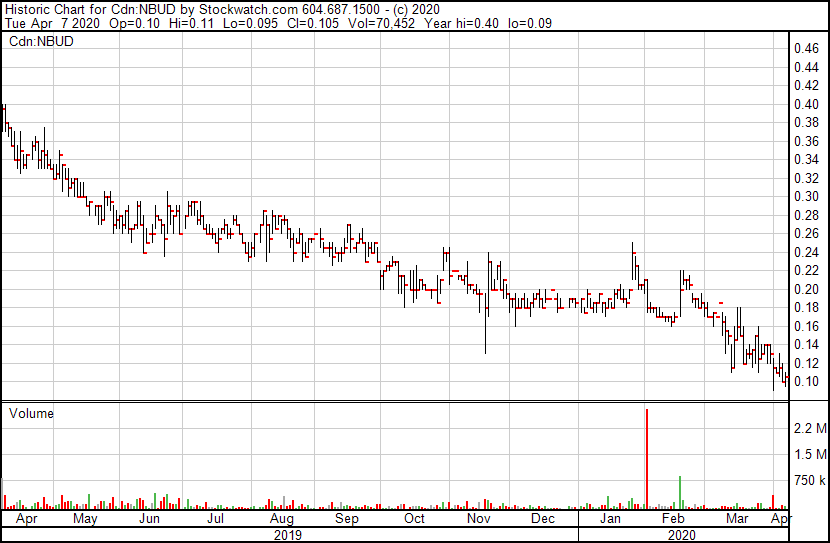
Bevcanna (BEV.C) has beverages, but after reading this unmitigated bullshitery about their most recent product launch, Jase, I want them to die in a fire.
The Jase brand distinctly evokes California cool — the endless summer sun combined with a vibrant hedonism. The mood is upbeat. The style — bold; the attitude — confident. Coined from ganja, the Sanskrit word for hemp or cannabis, and the word base, Jase suggests a brand that is approachable, upbeat and bold.
Go fuck yourself, Brian from Marketing. Who ordered the word salad with extra cheese?
Bevcanna actually has what many others who want to do beverages don’t, in an actual bottling facility. But while they have a hemp cultivation license and a cannabis research license, they don’t have a cannabis processing license (yet) which means they’re doing deals in Europe and the US to keep the wheels turning.
And the wheels are turning. Fluffy markeing speak aside, Bevcanna is a deal factory, which shows there’s a lot of interest in the beverage space, if not a lot of deliverability.
But that doesn’t mean there’s going to see beverages from Bevcanna in your fridge before the fall. Though they announced their Gruv iced tea line in August 2019, the company doesn’t expect it ready for launch before Q4 2020.
Bevcanna will commence white label beverage production in Canada by third quarter 2020. The company will manufacture beverages for other Canadian licensed producers that wish to leverage their brands’ equity to create infused beverages. The high regulatory barriers to entry for cannabis-infused beverages are proving challenging for many licensed producers that wish to expand their brands into this emerging category. Beverages are Bevcanna’s core expertise and Bevcanna’s world-class bottling facility has been designed with maximum flexibility, to cover a wide array of bottle sizes and form factors, allowing the company to fully service its white label client needs.
It should be noted the CEO has been buying a lot of his own stock, which is usually a sign of good things going on at the coalface. Or it could be a case of his $11 million market cap proving just too cheap to ignore.
One deal recently announced by Bevcanna is that they’re using Nextleaf (OILS.C) tech to make their beverages happen.
“For the past three years, our team has focused on developing efficient, patented extraction technology to put distilled cannabinoids into IP-protected delivery formats such as beverages and edibles,” said [Paul] Pedersen.
The developers behind the acquired IP combine expert chemical engineering with tenured experience from one of the largest Canadian dairy product manufacturers. By meeting the second and final milestone defined in the agreement, Nextleaf will issue the developers 937,500 Nextleaf common shares at a price of 32 cents per share.
OILS has a market cap of just $23 million, but that’s up 50% in the last few weeks.
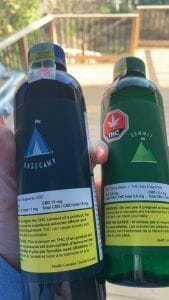
Valens Groworks (VLNS.V) just announced they’re out with two new cannabis drinks, in Basecamp (CBD) and Summit (THC). Early indications are they’re decent.
The new line of beverages includes Basecamp, a CBD-forward iced tea, and Summit, a THC-forward citrus water. Basecamp will be available at select retailers throughout Ontario in the coming days, with additional markets expected to follow. Summit is expected to be available at select stores in the coming weeks.
Summit and Basecamp were developed using the SoRSE by Valens emulsion technology which transforms cannabis oil into water-soluble forms for use in beverages, edibles, topicals and other consumer products while eliminating cannabis taste, colour or smell. The technology provides a number of advantages including faster observed onset times compared with other infused beverages and edibles; a significant reduction of offset time; an ability to use lower doses of cannabinoids due to enhanced bioavailability; and increased consistency and stability with the potential to achieve more than one-year shelf life.
Valens has a lot more going on that’s interesting, which has allowed it to boast a share price that’s been very level until the markets crashed. Strength while others burn is respectable.
But, for mine, the winner of the cannabis beverage wars is a company we can’t get in Canada – yet. They were among the first to head into the beverage space, setting up camp in California, they have their own bottling line, they have distribution deals, and they have products that have passed the taste test in a very competitive landscape.
Take a bow, Tinley (TNY.C).
Ever mixed up a batch of margaritas and wished they were powered by weed instead of booze? Your dreams have come true with Tinley’s single-serving, alcohol-free, ready-to-drink THC-infused version of that classic cocktail. Take it to the beach and marvel at the crisp lime and tequila flavor, minus the headaches and spins. With just 10 milligrams of THC derived from Pineapple Jack sativa, one bottle is considered a single serving and provides an uplifting buzz that won’t leave you feeling lost at sea.
Now, obviously, nobody can stop you from adding some actual tequila, but that doesn’t mean you should.
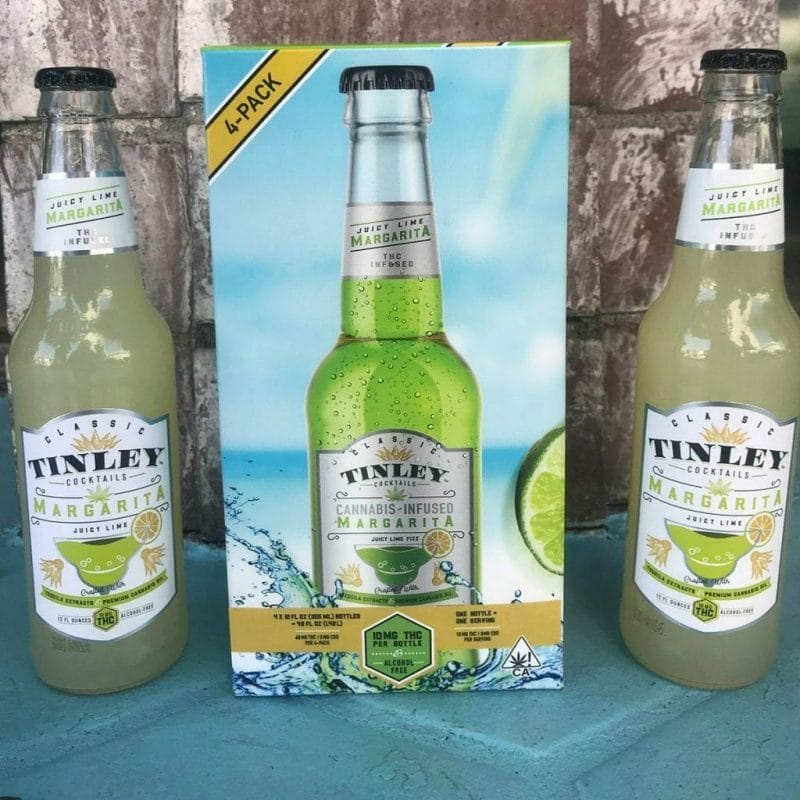
Others agree.
Hey Chris
I have tried the Tinley Beverages on a trip to Cali last year. The most fun I’ve had high in a long time. On top of that, the drinks I tried were the Stone Daisy, High Horse, Amaretto and Cinnamon Cask. They were all great tasting. I can’t wait for these to hit Canada— Brian Cyr (@BlindEyeFoto) April 7, 2020
In terms of THC, I’ve tried Legal by Mirth Provisions and Tinley’s entire lineup. Thoroughly enjoyed all of Tinley’s drinks. Legal was too sugary and viscous but it tasted decent.
— Landon Bryce (@LazerLabe) April 7, 2020
TINLEY! Number one by a long shot. Their single serves are something you can sip on all day. 5 min onset no weed taste
DIXIE… Not even sure you can call elixir a beverage. I mean do you consider buckle’s to be a beverage?
Canopy… Pretty awful taste onset time reasonable.
— BKISS (@B_KISSIT) April 7, 2020
Tinley used to be a client, and for a long time, so we’re happy to see the market starting to get with their program.
That said, getting them into the Canadian retail sales space is going to be work. While they have a distribution deal, that luscious packaging isn’t going to play in Canada’s overregulated ‘no products that looks decent’ space, and the alcohol adjacent wording of things like margarita will also need a change.
But it’s doable, if a partner with a Canadian license wants to get off its ass.
Before any of Tinley’s products may be sold in Canada, Tinley will need to reach an agreement with at least one Health Canada licenced manufacturer to provide raw cannabis materials and manufacture Tinley’s beverages. Additionally, Tinley’s beverages, along with its packaging and labelling, must be approved by Health Canada before the beverages will be legally permitted to be sold in Canada. There can be no assurance that these products will be approved by Health Canada, and Tinley may be required to make changes to its packaging, labelling, dosages and formulae of its current beverages manufactured and sold in California to comply with Canadian regulations.

Frankly, big LPs should be beating a path to their door.
TNY is up a double in the last month. Something’s afoot.
Cheers.
— Chris Parry
FULL DISCLOSURE: Though several companies mentioned in this article have been clients previously, none are at the time of writing and the author holds no position.

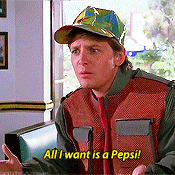
Leave a Reply